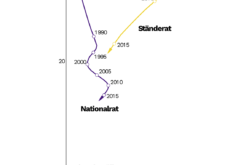In a CEPR Discussion Paper, Sascha Becker, Thiemo Fetzer, and Dennis Novy argue that education and income mainly explain voting outcomes. In the abstract of their paper, the authors write: We find that exposure to the EU in terms of immigration and trade provides relatively little explanatory power for the referendum vote. Instead, … fundamental characteristics of the voting population were key drivers of the Vote Leave share, in particular their education profiles, their historical...
Read More »In Switzerland, the “Elites” Represent Voters
In a post on DeFacto, Michael Hermann argues that in Switzerland the conflict between voters and “political elites” actually has receded. According to Hermann, popular votes helped clarify where voters disagreed with parliamentarians, and this led policy makers to adjust. The figures illustrate how over time, votes in the two chambers of parliament converged towards outcomes in popular votes. Campaigns supported by the right-wing SVP party may have contributed to these developments....
Read More »The Case Against Democracy
In the New Yorker, Caleb Crain reviews the case. It’s a difficult case to make if most voters are uninformed. Jamming the stub of the Greek word for “knowledge” into the Greek word for “rule,” Estlund coined the word “epistocracy,” meaning “government by the knowledgeable.” It’s an idea that “advocates of democracy, and other enemies of despotism, will want to resist,” he wrote, and he counted himself among the resisters. As a purely philosophical matter, however, he saw only three valid...
Read More » Swiss Economicblogs.org
Swiss Economicblogs.org

